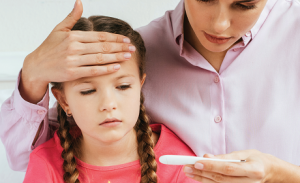You did the research, kept up-todate with safety protocols and precautions and asked your doctor more questions than you can count. Of course you’d know whether your kid has the flu or COVID-19, right? Wrong — it’s just not that simple.
According to Mary Carol Burkhardt, M.D., MHA, associate division director, Primary Care, and medical director, Hopple Street Health Center at Cincinnati Children’s,, if your kid comes home with a sore throat or fever, your best bet is to keep him home.
“It is more critical than ever not to send a child to school or daycare when they have sick symptoms,” says Burkhardt. “It would be very appropriate to call your pediatrician or provider and have your child seen.”
Dr. Mom is on it. But telling the difference between COVID-19 and flu symptoms is tricky. The honest truth, even your providers may have a hard time distinguishing your kids’ symptoms, according to Burkhardt, as the symptoms can most definitely overlap.
“For example, fever, chills, fatigue, cough, shortness of breath, headache, etc can be seen in both illnesses,” she continues. “Due to this overlap, testing for COVID-19 is important to be able to know the difference. There are some tests available that test for both flu and COVID-19.”
SHOULD YOUR CHILD BE TESTED?
We are buried in information — therefore it’s hard knowing when and if your kids should be tested for COVID-19, as every state has their own protocols. Moreover, it’s not the most comfortable test for anyone, however, most kids seem to tolerate the test rather well, sometimes more than adults, according to Burkhardt.
A child should be tested for COVID-19 when they have sick symptoms or if they have been in close contact with someone who has tested positive for the novel virus, she continues.
“Children that are ‘a contact of a close contact’ do not need to be tested unless symptoms develop,” says Burkhardt, “Call your provider if your child has symptoms or is a close contact.”
Current COVID-19 testing is done with a nasal swab, or nasopharyngeal swab (a Q-tip going up the nostril). If your kid is showing sick symptoms such as fever, cough, chills, congestion or sore throat, the best action is to keep them home and call your pediatrician for an in-person evaluation or via telehealth. From there they will guide you through the next steps.
MAINTAINING CHILD HEALTH
Right now, the most important thing you can do for your kids is to keep them healthy. With flu season coinciding with COVID19, Burkhardt recommends getting the flu shot – while we currently don’t have vaccines for coronavirus, we do have an effective flu vaccine.
And don’t forget well checks. Some are skeptical about even stepping foot into a doctor’s office right now; it is safe to bring them to the pediatrician and important to continue preventative care such as vaccinations and screenings, says Burkhardt.
“These are critical to keeping your child thriving and healthy!” she continues.
Some pediatricians offer virtual check ups if you are uncomfortable with physically taking your kids to their well visits.
COVID-19 Testing
Get your family tested and feel safe while doing it, too. When in doubt, contact your family doctor.
Ohio Department of Health; coronavirus.ohio.gov
Pop-up testing services throughout Ohio. Check website for specific dates and locations.
Northern Kentucky Health Department; nkyhealth.org
Lists resources and locations for families to get tested.
St. Elizabeth Locations; stelizabeth.com/covid-testing
Drive-through testing locations for families; for ages 5 and younger, staff will teach parents how to take the swab.
City of Cincinnati; cincinnati-oh.gov
Locations to get tested near you, testing procedures and more.
The Health Collaborative; healthcollab.org
Testing locations (including TriHealth, Mercy Health, UC Health and others), outdoor testing sites and more.





